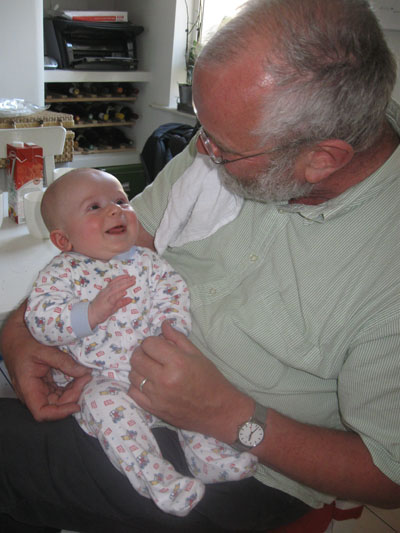I first heard The White Raven, an a cappella vocal trio, last year on Lyric fm singing All the fine young men and was immediately captivated.
I bought their second cd, The place where Life began at Christmas and as I recently discovered that their first cd, The water is wide had been reissued, bought that last week.
Both are beautiful, they sing mainly Irish folk songs but also some of Thomas Moore’s melodies and some more modern folk music.
Listen to a sample here
One of their songs on The water is wide seemed to have been written especially for this besotted Grandfather as it was called An Paistín Fionn which I translated as The Baby Fionn.
It is beautifully sung by the trio, and the first few times I played it I just accepted the lovely music and the poetic words and let them wash over me.
I suppose I did feel that the chorus was a little strange for a song to a baby ;
Is tusa mo rún, mo rún, mo rún
Is tusa mo rún is mo ghrá geal
Is tusa mo rún is mo chumann go buan
‘Sé mo chreach gan tú agam ó do mháithrín
For you are my sweetheart
My Sweetheart and my bright love,
My sweetheart and my friend forever
And I’m desolate that you are with your mother not me.
It wasn’t until Síle , whose Irish is far superior to mine, came home from school that we began to crack it.
Here is the first verse;
Grá mo chroí mo pháistín fionn
A croí is a haigne ag gáire liom
A cíocha geala mar bláth na n-úll
Is a píob mar eala lá Márta
This we translated as;
Love of my life my little blond child
Your heart and your face laughing up at me
Your bright breasts like apple blossom
And your neck like a swan’s in March
These were certainly not appropiate words to be singing to a small infant !
I realised that what we had here was a love song.
I had been totally misled by the paistín assuming that it meant child as it usually does.
Here the poet was using it in much the same way as modern usage of “babe” or “baby” for sweetheart.
My second reason for confusion was the word Fionn, which I took to be the name. However in the text, given with the cd, it was not written with a capital F therefore it meant blonde or fairhaired.
Next point of confusion was that this particular song is sung by the female soilist in the group, making me leap to the wrong conclusion.
The answer was there in the text all the time.
The word a croí was not aspirated as a chroí which it would have been if they were talking about a male.
So all in all I was just about as wrong as could be.
What I had taken as a lullaby sung by a mother to her infant called Fionn was actually quite a racy love song sung by man to the blonde girl he fancied.
But still, with just a little bit of tweaking I can take two lines out which seem to me totally appropiate for the beloved Grandson,
Grá mo chroí mo pháistín Fionn
A chroí is a haigne ag gáire liom
Love of my heart my little Fionn
Your heart and your face laughing up at me.

1 comment.
